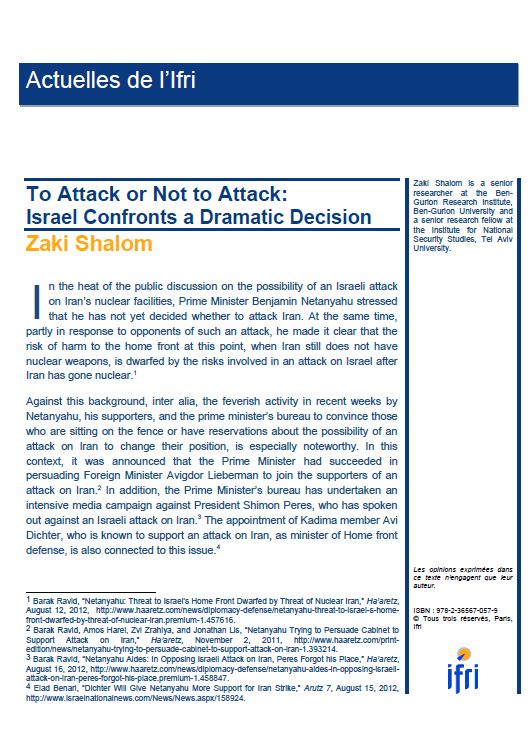To Attack or Not to Attack: Israel Confronts a Dramatic Decision

In the heat of the public discussion on the possibility of an Israeli attack on Iran’s nuclear facilities, Prime Minister Benjamin Netanyahu stressed that he has not yet decided whether to attack Iran. At the same time, partly in response to opponents of such an attack, he made it clear that the risk of harm to the home front at this point, when Iran still does not have nuclear weapons, is dwarfed by the risks involved in an attack on Israel after Iran has gone nuclear.
Against this background, inter alia, the feverish activity in recent weeks by Netanyahu, his supporters, and the prime minister’s bureau to convince those who are sitting on the fence or have reservations about the possibility of an attack on Iran to change their position, is especially noteworthy. In this context, it was announced that the Prime Minister had succeeded in persuading Foreign Minister Avigdor Lieberman to join the supporters of an attack on Iran. In addition, the Prime Minister’s bureau has undertaken an intensive media campaign against President Shimon Peres, who has spoken out against an Israeli attack on Iran. The appointment of Kadima member Avi Dichter, who is known to support an attack on Iran, as minister of Home front defense, is also connected to this issue.
Undoubtedly, the Iranian issue presents Israeli decision makers, and in particular, Prime Minister Netanyahu, with a magnitude of fateful decisions. We believe that the public discussion of this issue is positive in and of itself in a democratic society like Israel. Nevertheless, it is likely to cause damage to the country if it spills over into detailed information about operational issues, and especially, if Israel’s capabilities and limitations vis-à-vis Iran are discussed. As long as it remains on the political level and does not get into details of limitations and capabilities, it must be conducted within a serious framework for discussion, professional and politically impartial. Within this framework, it is legitimate for there to be disagreements. Below we will attempt to examine the main questions the Prime Minister will seek to answer when he decides about an attack on Iran.

Available in:
Regions and themes
ISBN / ISSN
Share
Download the full analysis
This page contains only a summary of our work. If you would like to have access to all the information from our research on the subject, you can download the full version in PDF format.
To Attack or Not to Attack: Israel Confronts a Dramatic Decision
Related centers and programs
Discover our other research centers and programsFind out more
Discover all our analyses
RAMSES 2025. Between Powers and Powerlessness
Never before have there been so many powers able to upset the international balance of power, and never before have the dominant powers seemed so powerless to counter the fragmentation of the world.
Out of Thin Air but More than a Mirage: The Politics of Saudi Arabia's Nascent Music Industry
This study critically examines Saudi Arabia’s nascent music industry, which is promoted as a key element of Vision 2030, Crown Prince Mohammed bin Salman’s strategic framework to diversify the kingdom’s economy. It explores how state-led investments in music and entertainment intersect with authoritarian governance. The author neither dismisses these investments as conspicuous spending nor reproduces an alarmist narrative of impending cultural imperialism. The article takes a political sociology approach to understand how Saudi entertainment plans consolidate domestic power and reshape regional cultural landscapes.
Hostage diplomacy of the Islamic Republic of Iran. The case of Europeans detained in Iran
The so-called hostage diplomacy of the Islamic Republic of Iran refers to a political and diplomatic strategy in which Tehran uses the detention of Western nationals, dual citizens, or Iranian citizens residing in Europe, Australia, or the United States as leverage in diplomatic negotiations. This practice aims to exert pressure to secure political, economic, or diplomatic concessions as part of Tehran’s asymmetric response strategy. Hostage diplomacy remains a controversial yet effective tool from the perspective of the Islamic Republic of Iran, given its context of economic sanctions and diplomatic isolation.
Is the Republican People’s Party (CHP) Rising from the Ashes?
The victory of the CHP [Cumhuriyet Halk Partisi, Republican People’s Party] in the Turkish municipal elections of March 2024 firmly established it as the leading party of opposition to the Islamic-conservative AKP [Adalet ve Kalkınma Partisi, Justice and Development Party], which has been in power since 2002.







